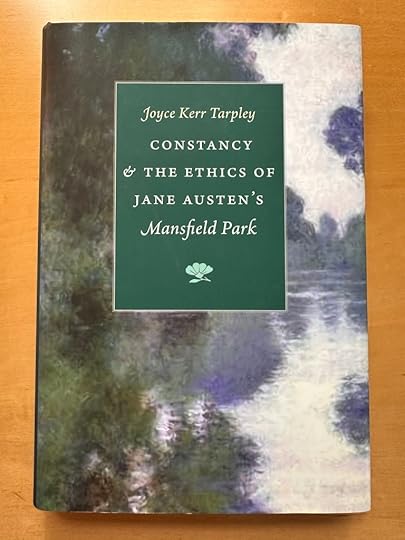Prodigal Sons in Sense and Sensibility, by Joyce Kerr Tarpley
Sense and Sensibility, more than any of Jane Austen’s other novels, is about sonship. Elsewhere I have considered two themes regarding sonship in this novel: the theme of promise-keeping and the theme of primogeniture. For the latter theme, the Bible’s Old Testament, specifically the book of Genesis, is the focus for my reading of sonship. For the present reading of sons and brothers in Sense and Sensibility, I turn once again to the Bible, this time to the New Testament Parable of the Prodigal Son. In The Prodigal Son in English and American Literature (2018), Alison M. Jack cites a commentator who explains its appeal to readers (and writers): “[M]ore than any other parable, this one—in part because of its domestic setting—has captured the imagination and emotions of readers.” Besides being the most well-known, it is also “the longest and most narratively complex” (2) of Jesus’s Parables. As such, it is an appealing literary choice for representing sons and brothers in Jane Austen’s unparalleled domestic settings.

(From Sarah: This is the eleventh guest post in “A Summer Party for Sense and Sensibility,” which began on June 20th and will continue through to the end of the summer. You can find all the contributions to the blog series here . I hope you’ll join the conversations about S&S in the comments here and on social media: #senseandsensibilitysummer. Thanks for celebrating Jane Austen’s first published novel with us!)
Mansfield Park has more sons (six) and one clear-cut prodigal (Tom Bertram); however, Austen plays with the Parable as she does with the Genesis narrative in Sense and Sensibility (“Playing with Genesis”). In the original New Testament version (Luke 15:11-32), the younger son demands his inheritance, travels to a “far country” where he squanders it, suffers, experiences an epiphany, and returns to confess his sins to his father and seek redemption. In the meantime, the elder son dutifully stays home, but when his father forgives the sins of his younger “prodigal” brother and throws a party to celebrate his “rebirth,” the elder brother expresses self-righteous anger. The Parable ends with an expression of unconditional love for both sons by their God-like father figure.
Austen switches the roles with the Ferrars sons. Robert Ferrars, the younger “favorite” son, stays home with their mother. The elder son, Edward, goes away for his schooling (to Plymouth) and is essentially homeless while waiting for his mother, whose “conditional” love requires strict obedience to her wishes, to give him his inheritance. There is no God-like father figure in the novel because Austen, as a comic writer, is most interested in exploring the way in which her characters overcome their weaknesses and flaws—or the way in which they fail to do so.
In the case of the Brandons, the father sends his younger son away—exiles him to a “far country”—in order to marry off the elder son to his ward, Eliza, whose inheritance is needed to salvage the estate. Finally, in another reversal of the Parable, the elder Brandon brother squanders his inheritance and puts the estate at risk while the younger Colonel Brandon comes home (after his elder brother’s death) to save it. Willoughby, the third important son in the novel, has no brother, but like the Prodigal Son, his confession plays a major role in the novel.

“I have sinned against heaven and in thy sight” (Luke 15:18)
The key scene for Jesus’s Prodigal Son comes when he acknowledges his sins during a brief confession to his father. In Sense and Sensibility, each son who is a potential hero—Colonel Brandon, Edward Ferrars, and John Willoughby—has a confession scene during which he explains his sins to Elinor, who is the next best thing to the Parable’s father figure. Willoughby’s confession comes closest to the Prodigal Son’s because he commits the most serious sins, and he is most in need of redemption. Insofar as the confession scene is similar to the Parable, what is most noteworthy is Elinor’s willingness to forgive Willoughby, a reprobate who wreaks havoc in the lives of three women—Eliza, Marianne, and Miss Grey. Her forgiveness, despite her own recognition of Willoughby’s flaws, brings her closest to the role of the father figure in the Parable.

What’s Wrong with Willoughby’s “Confession”
Unlike the Prodigal Son in the Parable, Willoughby’s confession is neither an acknowledgement nor a repentance for his sins. His primary sin is his seduction of the fifteen-year-old Eliza, whom he left pregnant, helpless, and alone in Bath without any way to contact him. Hebrews 13:4 states the rules for Christian sexual conduct, which he has violated: “Honor marriage and guard the sacredness of sexual intimacy between wife and husband. God draws a firm line against casual and illicit sex” (Hebrews 13: 4, The Message). Moreover, according to nineteenth-century ecclesiastical law, “Willoughby’s behavior, including his sexual relationship with Eliza, is itself an implicit promise to marry her” ( “Sonship, Liberty, and Promise-Keeping”). Yet Willoughby neither acknowledges this behavior as a sin nor does he seek forgiveness for it. Instead, he blames Eliza for “the violence of her passions, [and] the weakness of her understanding,” and for not having the “common sense” to find out his whereabouts—even though he admits to not recollecting that he “had omitted to give her any direction” (Volume 3, Chapter 3).
His second sin is bearing false witness, thereby breaking one of the Ten Commandments. During his marriage ceremony to Sophia Grey, his vows are false—lies, in essence, made before God. “[F]or St. Thomas Aquinas, the vow is a commitment to God that ‘one may promise in one’s heart’” (Summa Theologica II-II. 88.1; Bronaugh 5). Moreover, his attitude toward his wife is one of contempt. He blames her, just as he does Eliza, rather than confessing that it was wrong to use her for her money when he cares nothing for her: “Do not talk to me of my wife . . . . She does not deserve your compassion—She knew I had no regard for her when we married” (Volume 3, Chapter 8).
Ironically, Willoughby is most sorry about his treatment of Marianne. By comparison, however, with his sins against Eliza and Ms. Grey, his treatment of Marianne, although cruel and thoughtless, does not rise to the same level.
Why does Willoughby confess? Two suggestive comments—one about his marital status and the other about Marianne’s—indicate that Willoughby’s motive is forgiveness with a catch—he hopes for another chance with Marianne. He fantasizes about “being at liberty again,” meaning his wife would be dead; he fantasizes about Marianne “being at liberty,” meaning he lives “in dread” of her marriage (Volume 3, Chapter 8). Willoughby, then, is still the selfish libertine who not only refuses to acknowledge his past sins, but also contemplates sins in the future. “[B]y that still ardent love for Marianne, which it is not even innocent to indulge” (Volume 3, Chapter 9), Willoughby dishonors his marriage by means of a death wish that according to Jesus’ standard (Matthew 5:28), would amount to adultery. In “Sense and Sensibility and Sin,” William Jarvis says Willoughby gives a “self-regarding confession, lacking in real penitence or any intention of reparation or amendment” (59).
If such is the case, why does Elinor forgive him? Patricia Meyers Spacks attributes Elinor’s forgiving change of heart to “a high proportion of sensibility in her make-up” and to Willoughby’s “sex appeal” (373, fn. 2). Jarvis, however, attributes it to Elinor’s “Christian and practical attitude” (59). Elinor’s forgiveness of Willoughby may seem to be unconditional; however, while she feels sorry for his loss, she recognizes that her “regret [is] rather in proportion to his wishes than to his merits” (Volume 3, Chapter 9). Elinor is affected by Willoughby’s powers but she is not unaware of being so.
In Jesus’s parable, the Prodigal Son’s confession and repentance allow him to “come home,” to be forgiven by his father, and to be restored to his family. In spite of Elinor’s forgiveness, however, Willoughby’s blindness to his sins will continue to block his happiness and his homecoming.
Quotations are from the annotated edition of Sense and Sensibility, with an introduction by Patricia Meyer Spacks (2013). The flower photos were taken last week at the Met Cloisters in New York City, by Sarah.

Works Cited
Bronaugh, Richard N. “Thomas Aquinas on Promises.” The Medieval Tradition of Natural Law. Ed. Harold J. Johnson. Kalamazoo, MI: Medieval Institute Publications, Western Michigan U, 1987. 1-5.
Jarvis, William. Jane Austen and Religion. Oxford, Stonesfield Press, 1996.
Tarpley, Joyce Kerr. “Playing with Genesis: Sonship, Liberty, and Primogeniture in Sense and Sensibility.” Persuasions 33 (2011), 89-102.
—. “Sonship, Liberty, and Promise-Keeping in Sense and Sensibility.” Renascence: Essays on Values in Literature 63.2 (2011), 91-109.

Originally from Newark, New Jersey (but now a proud Texan), Joyce Kerr Tarpley fell in love with Austen while traveling alone in England. “I was in my twenties, so I was close to the age of the heroine, and I found three used copies of Pride and Prejudice, Sense and Sensibility, and Northanger Abbey while browsing in a London bookstore. Many years later, while pursuing a PhD in literature at the University of Dallas, what kept me going was the knowledge that I would get to write my dissertation—the first one at UD—on Austen.”
With the encouragement of one of her UD professors, the late and beloved Dr. John Alvis, Joyce queried Catholic University of America Press about publishing a book based on her dissertation. While the press made it clear they did not publish dissertations, they gave her a chance—on the recommendation of one reviewer—to revise her initial submission. Several years and many revisions later, the book, Constancy and the Ethics of Jane Austen’s Mansfield Park, was published.
Her other essays on Austen have appeared in Persuasions: The Journal of the Jane Austen Society of North America and Renascence: Essays on Literature and Ethics, Spirituality and Religion.

If you enjoyed this post, I hope you’ll consider recommending it to a friend. If you aren’t yet a subscriber, please sign up to receive future guest posts in “A Summer Party for Sense and Sensibility.” The next post, “In the Matter of Sense v. Sensibility: An Excerpt from the Upcoming Novel Austen at Sea,” is by Natalie Jenner.
Here are the links to the last two posts, in case you missed them:
Isabelle de Montolieu’s Sense and Sensibility, by Peter Sabor

Read more about my books, including Jane Austen’s Philosophy of the Virtues and Jane Austen and the North Atlantic, here.



